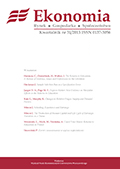Integracja instytucji nadzorczych w systemie finansowym na przykładzie Niemiec
W. Rogowski, W. Szpringer
ABSTRAKT: The paper's objective is to present the process of transformation of the prudential supervision that is taking place along with, among other things, the development of the financial system, the accession of the EU member countries to the Economic and Monetary Union and the preparation for implementation of the new supervision standards under the so-called Basle II. The changes also cover the remaining sectors of the financial system outside the banking, this leading to integration of the entire financial services supervision within the framework of a single supervisory body. In the paper, this process is presented basing on the experience of Germany where, in 2002, the office of financial services supervision (BAFin) was established in a new legal form and endowed with a high degree of independence. It is the on-going integration of financial sectors and markets, the convergence and unification of financial services, the formation of financial conglomerates and the quick technological changes that is considered to be the reason for integration of the supervisory bodies. The merger of the German supervisory bodies has resulted in a reduction in employment and savings in the area of equipment thanks to the synergy effect, especially in the so-called general service administration (computerinew structure. The main advantages are expected to ensue as a result of the extension of the uniform supervision on similar risks throughout the whole financial system, the gradual disappearance of arbitrage between separate financial market segments, a fuller supervision coverage of innovations that are arising on the junctions of different markets, the improvement in communication among the regulators and, in the course of time, the formation of a new, market-oriented supervision culture. Another effect, not without importance, will be the expected strengthening of Germany's position within the international supervisory bodies. On the other side, there are some possible threats, too. The authors present the details of integration, the regulatory governance, as well as the actual trends in the BAFin's operation. They draw attention to the existence of complications in the process of integration of prudential supervision institutions, some resulting from strong determinants that stem from the specificity of national financial and legal systems and the state of their development. The most recent trends consist in placing the integrated the prudential institution within the structure of the central bank, as has been the case in Holland and Ireland. There, the powerful position of the central bank has been utilized to strengthen the role of the integrated financial supervision. zation). However, it is not this that is considered to be the success factor of the
Pełny tekst (PDF)
Numer wydania: 16
W numerze:
Integracja instytucji nadzorczych w systemie finansowym na przykładzie Niemiec
W. Rogowski, W. Szpringer
ABSTRAKT |
PDF
The paper's objective is to present the process of transformation of the prudential supervision that is taking place along with, among other things, the development of the financial system, the accession of the EU member countries to the Economic and Monetary Union and the preparation for implementation of the new supervision standards under the so-called Basle II. The changes also cover the remaining sectors of the financial system outside the banking, this leading to integration of the entire financial services supervision within the framework of a single supervisory body. In the paper, this process is presented basing on the experience of Germany where, in 2002, the office of financial services supervision (BAFin) was established in a new legal form and endowed with a high degree of independence. It is the on-going integration of financial sectors and markets, the convergence and unification of financial services, the formation of financial conglomerates and the quick technological changes that is considered to be the reason for integration of the supervisory bodies. The merger of the German supervisory bodies has resulted in a reduction in employment and savings in the area of equipment thanks to the synergy effect, especially in the so-called general service administration (computerinew structure. The main advantages are expected to ensue as a result of the extension of the uniform supervision on similar risks throughout the whole financial system, the gradual disappearance of arbitrage between separate financial market segments, a fuller supervision coverage of innovations that are arising on the junctions of different markets, the improvement in communication among the regulators and, in the course of time, the formation of a new, market-oriented supervision culture. Another effect, not without importance, will be the expected strengthening of Germany's position within the international supervisory bodies. On the other side, there are some possible threats, too. The authors present the details of integration, the regulatory governance, as well as the actual trends in the BAFin's operation. They draw attention to the existence of complications in the process of integration of prudential supervision institutions, some resulting from strong determinants that stem from the specificity of national financial and legal systems and the state of their development. The most recent trends consist in placing the integrated the prudential institution within the structure of the central bank, as has been the case in Holland and Ireland. There, the powerful position of the central bank has been utilized to strengthen the role of the integrated financial supervision. zation). However, it is not this that is considered to be the success factor of the
Różnice w postrzeganiu jakoœści usług bankowych między pracownikami i klientami banków komercyjnych
D. Gadowska, J. Kudła
ABSTRAKT |
PDF
The banks, in aspiring after offering the highestlevel service quality, can test the perception of this quality through polls among both their clients and their own employees. This paper is aimed at verifying the proposition about the identity of assessment of the service quality as perceived by the above two groups of persons polled. To solve the thus formulated problem, the factor analysis method as well as the data from questionnaires, all containing the same set of questions, addressed to the bank's employees and clients, were used. It turned out that some quality dimensions were equally perceived in the case of both the groups but, at the same time, some meaningful differences appeared. The employees, in general, differently perceived certain groups of questions, this probably resulting from their better knowledge of the bank's mode of operation. In addition, in their answers a certain reference to internal situation in the given bank's branch could be observed, which was absent in the quality assessments gathered among the clients. Whereas, among the consumers of services a greater importance was attached to the bank's reliability and the history of the client's earlier contacts with the bank. This means that the exclusive use of employee polls is, in a certain way, imperfect, since it permits better to spot the problems of organization and management at the bank branch level, but at the same time to an insufficient degree recommends the way of treating the client by the bank.
O teorii i numeryce (pomiarze) organicznego składu kapitału
I. Timofiejuk
ABSTRAKT |
PDF
In the paper, feasibility of a statistical theory, here called numerics (counting), being an expression of the Marxist notion of organic capital composition, was examined. To this end, the Laspeyres-Paasche theory of aggregation and construction of complex indices was presented for: a) two delimited periods (moments) b) a series (sequence) of monobasic, chain and cautionary-link indices. Conclusion was drawn that the definition of organic composition of capital was statistically reflected by the relation between the index of value composition of capital and the technical composition of capital. Finally, the question was put about the intellectual interaction between the Marxist reproduction schemes (and the theory of social capital formation in general) and the Keynes theory.
Rynek obligacji komunalnych w Polsce —czynniki jego obecnego kształtu oraz perspektywy rozwoju
A. Kopańska
ABSTRAKT |
PDF
Polish regulations for communal bonds were established in 1995 (and then amended in 2000) mostly following the US model (thanks to American advisors from the USAiD and the World Bank). Unfortunately, after 10 years, the Polish municipal bonds depart far from their American pattern. In the article, some elements of the communal capital market in Poland are analyzed by comparison with the American market. Thanks to this comparison, the factors are identified that have exerted the greatest influence on the current functioning of the Polish communal bonds. Also, forecasts of further development of thismarket are presented.
Rozwój standardów kwalifikacyjnych w bankowoœści polskiej
A. Stefański
ABSTRAKT |
PDF
The choice of a profession should be determined by certain traits of character, cultural habits and predisposition. Qualification standards?a description of requirements to be fulfilled by bankers-define the scope of knowledge, skills and predisposition necessary for the employee;s adequate functioning at a given post. In the system of qualification standards of the Polish banking there are four professional ranks:
- independent bank clerk;
- qualified bank clerk;
- expert in one of the nine areas of specialisation;
- bank expert/manager in one of the four integrated areas of specialisation.
Additionally, in 2003, the European Bank Training Network (EBTN) project aimed at preparing and implementing the European qualification standard and the European certificate of banker was worked out. Attaining a professional rank requires: a) passing a relevant theoretical exam; b) acquiring adequate practical skills, approved by the bank, and gaining sufficient work experience. Raising one's professional qualifications and attaining higher professional ranks within qualification standards of the Polish banking is becoming more and more popular. By the end of June 2005 there were altogether 522 examination sessions, and 10,776 candidates successfully completed the certification procedure.
Determinanty konkurencyjnoœci międzynarodowej - ewolucja poglądów
K. Pawlak
ABSTRAKT |
PDF
Competitiveness, both on the micro- and the macroeconomic scale, is at present acquiring key importance for the economic progress of each country. At present the increase in international competitiveness is one of the most important developmental challenges formany countries. This paper tries to synthesize existing classifications of the competitiveness determinants and shows changes in the character of competition. From the great variety of these classifications one common point of the considerations is emerging. Nowadays, competitiveness is not restricted only to competition in prices and costs. The quality factors begin to play a much more important role. In parallel with the changing competition character, evolution from the hard competitiveness determinants to the soft ones is observed. It is also worth stressing that unique production factors, created by human, are being taken into account much more than the traditional ones.

